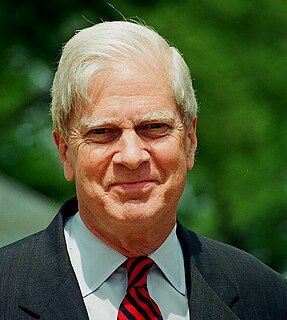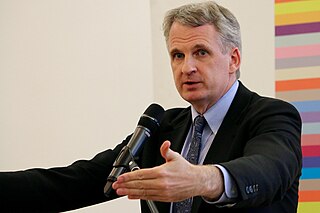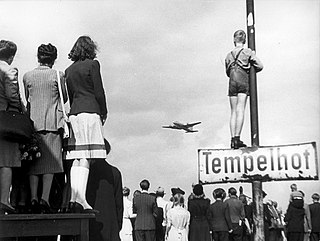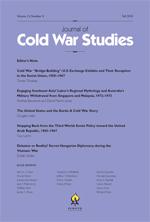
James Hadley Billington was a leading American academic and author who taught history at Harvard and Princeton before serving for 42 years as CEO of four federal cultural institutions. He served as the 13th Librarian of Congress after being nominated by President Ronald Reagan in 1987, and his appointment was approved unanimously by the U.S. Senate. He retired as Librarian on September 30, 2015.
John King Fairbank, was a prominent American historian of China. Considered the doyen of post-war China studies, the Fairbank Center for Chinese Studies at Harvard University is named after him. Among his most widely read books are The United States and China, which was first published in 1948 and went through revisions in 1958, 1979, and 1983, and his co-edited series, The Cambridge History of China.
Stanley Hoffmann was the Paul and Catherine Buttenwieser University Professor, emeritus at Harvard University.

Timothy David Snyder is an American author and historian specializing in the history of Central and Eastern Europe, and the Holocaust. He is the Richard C. Levin Professor of History at Yale University and a Permanent Fellow at the Institute for Human Sciences in Vienna.
Alexander Dallin was an American historian, political scientist, and international relations scholar at Columbia University, where he was the Adlai Stevenson Professor of International Relations and the director of the Russian Institute, and at Stanford University, where he was the Raymond A. Spruance Professor of International History and served as Director for the Center for Russian and East European Studies.
Philosophy of geography is the subfield of philosophy which deals with epistemological, metaphysical, and axiological issues in geography, with geographic methodology in general, and with more broadly related issues such as the perception and representation of space and place.
Ellen Wolf Schrecker is an American professor emerita of American history at Yeshiva University. She has received the Frederick Ewen Academic Freedom Fellowship at the Tamiment Library at NYU. She is known primarily for her work in the history of McCarthyism. Historian Ronald Radosh has described her as "the dean of the anti-anti-Communist historians."
Jim A. Kuypers is an American scholar and consultant specializing in communication studies. A professor at Virginia Tech, he has written on the news media, rhetorical criticism and presidential rhetoric, and is particularly known for his work in political communication which explores the qualitative aspects of framing analysis and its relationship to presidential communication and news media bias.

Jan Čulík is a Czech academic and independent journalist. He is the founder and editor of the independent Czech Internet daily Britské listy since 1996.

Ruth R. Wisse is the Martin Peretz Professor of Yiddish Literature and Professor of Comparative Literature at Harvard University. She is a noted scholar of Yiddish literature and of Jewish history and culture.
Mark Selden is a coordinator of the open-access journal The Asia-Pacific Journal: Japan Focus, a senior research associate in the East Asia Program at Cornell University, and Bartle Professor of History and Sociology at Binghamton University. He graduated from Amherst College with a major in American Studies and completed a Ph.D. at Yale University in modern Chinese history. He was a founding member of the Committee of Concerned Asian Scholars in the 1960s and for more than thirty years served on the board of editors of The Bulletin of Concerned Asian Scholars. He is also the editor of book series at Rowman & Littlefield, Routledge, and M.E. Sharpe publishers.
Philip A. Kuhn was an American historian of China and the Francis Lee Higginson Professor of History and of East Asian Languages and Civilizations at Harvard University.
Andrew Alexander Michta is a political scientist and Dean of the College of International and Security Studies at the George C. Marshall European Center for Security Studies in Germany. Previously he was Professor of National Security Affairs at the US Naval War College. He was also an affiliate of the Minda de Gunzburg Center for European Studies, an Adjunct Fellow at the Center for Strategic and International Studies – Europe Program in Washington, DC, and an adjunct political scientist at the RAND Corporation.
Bucknell University Press (BUP) was founded in 1968 as part of a consortium operated by Associated University Presses and is currently partnered with Rowman & Littlefield. Since then it has published more than 1,000 titles in the humanities and social and biological sciences. The first title was published in 1969.

"Truth prevails" is the national motto of the Czech Republic. The motto appears on the standard of the President of the Czech Republic, which the Czech Constitution designates a national symbol. Before the dissolution of Czechoslovakia in 1993, the motto was the motto of Czechoslovakia and appeared on the standard of the President of Czechoslovakia as well.

Marilyn B. Young was a historian of American foreign relations and professor of history at New York University.

Janusz Bugajski is a Senior Fellow at the Center for European Policy Analysis (CEPA) in Washington DC and host of “Bugajski Hour” and “Bugajski Time,” television shows broadcast in the Balkans. He is the former Director of New European Democracy Program at the Center for Strategic and International Studies (CSIS).

Sebastian Heilmann is a German political scientist and sinologist. He serves as the founding president of the Mercator Institute for China Studies (MERICS) in Berlin, a think tank established in 2013 by the Mercator Foundation. Heilmann has published on China’s political system, economic policy and international relations. He edited the guide to China's Political System and Chinas's Core Executive: Leadership Styles, Structures and Processes under Xi Jinping, 2016. With Elizabeth J. Perry he co-edited the volume Mao’s Invisible Hand: The Political Foundations of Adaptive Governance in China. With Dirk H. Schmidt he co-authored China's Foreign Political and Economic Relations: An Unconventional Global Power. He is the author of the book Red Swan: How Unorthodox Policy-Making Facilitated China's Rise. Heilmann is a professor for the political economy of China at the University of Trier.

Christiane Lemke is a professor of political science. She holds the chair in international relations and European studies at the University of Hanover. In 1991-1992, she was a Visiting Krupp Chair in the department of government at Harvard University and from 2010 to 2014 she held the Max Weber Chair at New York University.












